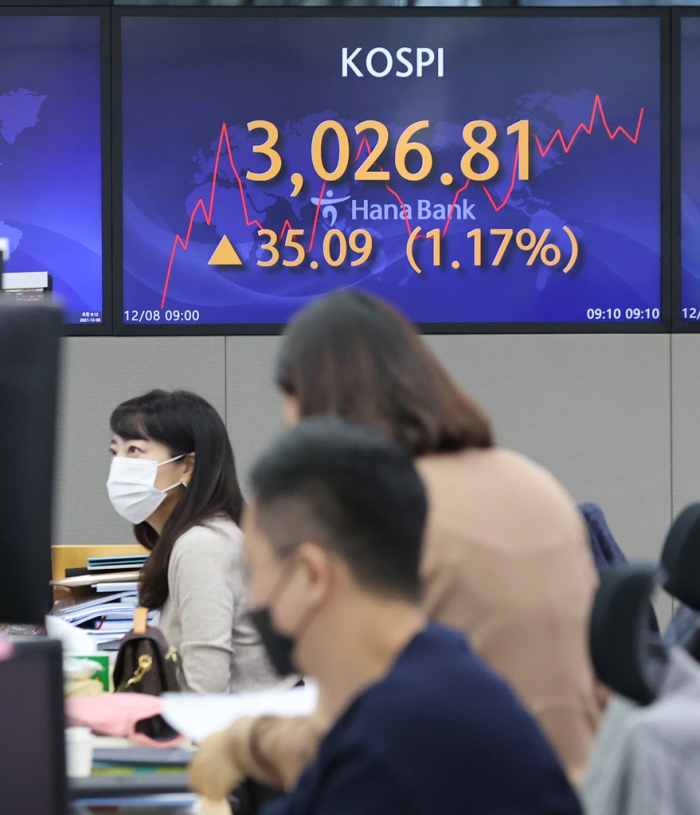Markets
Foreigners buy Kospi futures to raise bullish bets on Korea stocks
Kospi 200 futures see $510 mn inflows on expiry day; foreigners have bought $3.4 bn each in spots, futures since November
By Dec 09, 2021 (Gmt+09:00)
2
Min read
Most Read
LG Chem to sell water filter business to Glenwood PE for $692 million


Kyobo Life poised to buy Japan’s SBI Group-owned savings bank


KT&G eyes overseas M&A after rejecting activist fund's offer


StockX in merger talks with Naver’s online reseller Kream


Mirae Asset to be named Korea Post’s core real estate fund operator



Foreigners bought Kospi 200 futures contracts on “quadruple witching day," the quarterly simultaneous expiration of South Korean options and futures contracts, indicating overseas investors are extending bullish bets on the country’s stock markets.
Foreign investors on Thursday, Dec. 9 -- when contracts of futures and options expired -- purchased a net 600 billion won ($510 million) in Kospi 200 futures contracts. That helped the main Kospi end up 0.93% to 3,029.57 even as foreigners sold a net 140 billion won in spot shares on the main bourse.
“They have been accumulating long positions in Kospi 200 futures for March expiry,” said Jun Gyun, a senior analyst at Samsung Securities, who covers equity derivatives. “That suggested foreign investors will maintain bullish bets on Korean markets.”
Stock market players in Seoul closely watched foreign trading in the futures market on the expiry day to gauge further demand for Korean stocks from overseas investors since some saw their purchases of spot stocks as position adjustments after massive short selling.
DEMAND FOR BOTH SPOTS AND FUTURES
The Kospi 200 futures and the Kospi have been enjoying massive inflows since last month. Foreign investors bought a combined net 4 trillion won each in spot stocks on the Kospi and the futures contracts since November as of Dec. 9, according to the Korea Exchange data.
“Foreigners bought spots and futures at the same time, supporting the market that lost support due to lack of demand from retail investors,” said Jun. “Local institutional investors are expected to buy stocks, especially large caps, for dividends and those blue chips are likely to be supported until the ex-dividend dates.”
Shinhan Investment Corp. analyst Noh Dong-gil expected the Kospi to rise further, saying “foreigners’ net purchases of both spots and futures in December last year were a key factor for the rally in the first quarter of this year.”
Overseas investors came back to South Korea’s stock markets since bearish factors that had caused sell-offs were cleared, analysts said.
In the first ten months of the year, foreign investors dumped a combined net 30.7 trillion won in shares, limiting the upside in the Kospi.
“A strong dollar, China’s regulations and falling semiconductor prices drove foreign investors out of Korea until October,” said Jeong Myung-ji, head of investment and research at Samsung Securities. “Foreigners returned to Korean markets, especially for chipmakers’ stocks, as the dollar stabilized and China cut rates on relending. In addition, chip prices rebounded.”
Chipmakers, game developers and battery producers saw strong foreign stock inflows. Their top two picks were Samsung Electronics Co. and SK Hynix Inc. Foreigners have bought a net 1.6 trillion won in Samsung’s shares and 230 billion won in SK Hynix so far this month. They have purchased 100 billion won each in LG Chem Ltd. and Krafton Inc.
On Dec. 9, bellwether stocks Samsung and SK Hynix closed up 1.03% and 2.92% to 78,200 won and 123,500 won, respectively.
Write to Jae-Yeon Ko at yeon@hankyung.com
Jongwoo Cheon edited this article.
More to Read
-
 MarketsYear-end inflow to Korean main bourse sign of foreigner comeback?
MarketsYear-end inflow to Korean main bourse sign of foreigner comeback?Dec 08, 2021 (Gmt+09:00)
3 Min read -

-
 SemiconductorsSamsung, Hynix notch best day this year; metaverse to drive chip demand
SemiconductorsSamsung, Hynix notch best day this year; metaverse to drive chip demandNov 23, 2021 (Gmt+09:00)
3 Min read
Comment 0
LOG IN


